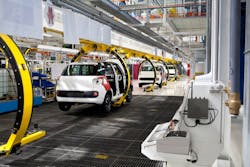As I noted in a recent post, the trend toward a greater focus on edge computing, rather than cloud computing, as the processing and analysis engine of choice for Industrial Internet of Things (IIoT) applications has been picking up a lot of speed. Cloud computing will, of course, still play a role in IIoT, but it’s clear that, for security concerns and bandwidth reasons—not to mention outages like this week’s event with Amazon Web Services—edge computing will increasingly be the IIoT computing platform of choice.
Read about the difference between edge, fog and cloud computing.
Beyond industry’s longstanding reticence to store information off site and high-profile cloud service outages, there are two other reasons supporting this restatement of the importance of edge computing for IIoT. One reason is recent venture capitalist calls that edge computing technology firms are the market’s next big investment target. The other is Dell’s release of additional edge computing products targeted specifically for industrial applications.
Looking first at the venture capitalist interest in edge computing, a recent article in Business Insider highlights comments made by Peter Levine, a partner at venture capitalist firm Andreessen Horowitz. Levine, along with many others, sees edge computing as the next multi-billion-dollar tech market. The article notes that Levine is “looking to fund entrepreneurs working on edge computing, which he sees as the next enormous change in computing, the real result of the Internet of Things.”
Levine sees the move away from a primary focus on cloud computing and toward edge computing taking place because of the sheer number of connected devices in applications ranging from cars, drones and medical equipment to manufacturing robots. “You will never have enough bandwidth and speed on the [cloud] network for that,” Levine said.
Paraphrasing Levine’s comments, Business Insider says, “The [edge] devices will handle their own processing and storage, while the cloud will morph into the big strategic brains behind it all. These smart machines [and their edge devices] will send only the most important bits to the cloud. The cloud will analyze, then share what it learned with all of the devices.”
There’s plenty of reason to listen to Levine, as he’s not simply an investor chasing the latest tech trend. His career experience ranges from work as an engineer and business leader at Veritas Software, Citrix and XenSource. Business Insider notes that, as a venture capitalist, Levine is known for successful enterprise investments in startups like GitHub, DigitalOcean, Mixpanel, Mesosphere and Udacity.
Levine expects that we’ll all start seeing edge computing “come online in a big way within the next five years.”
If you’re interested in hearing more about Levin’s predictions for edge computing, see the video at the end of this article.
As companies like Dell actively expand their edge computing platform offerings—with a newfound focus on industry applications in particular—Levine’s prediction looks increasingly like a safe bet.
This week, Dell Technologies announced the release of its Dell Edge Gateway 3000 Series. These edge gateways are designed to bring real-time intelligence capabilities to small spaces and harsh environments. The 3000 Series includes three models targeted specifically for application in the industrial automation, digital signage and transportation markets. The Model 3001 Edge Gateway is designed for general-purpose industrial automation and energy management use. Its flexible I/O includes programmable serial ports (RS-485/422/232) and a multi-function I/O port.
All models in this series feature an Intel Atom processor with 2 GB RAM and 8 GB eMMC storage as well as a 32 GB option and SD card for additional storage, Ethernet and USB ports, and certification for Wi-Fi, Bluetooth LE and optional 3G or 4G LTE for select countries. They can operate in a temperature range from -30 °C to 70 °C. The Edge Gateway 3000 also integrates digital GPS, accelerometers and atmospheric pressure sensors and supports a wide input power range from 12-57 V dc (with vehicle transient voltage protection) as well as Power-over-Ethernet (PoE) input.
Industrial automation supplier Emerson works closely with Dell to deliver IoT computing platforms for its customers. Referencing the release of the 3000 series, Mike Boudreaux, director of Connected Services at Emerson, said, “At Emerson, we need simple, scalable and secure connectivity solutions to help our customers collect data from their industrial equipment and make better business decisions based on that data. Our work together [with Dell] has enhanced our capabilities and is a perfect example of how OT and IT partners are critical to success for IIoT deployments.”
The Gateway 3000 Series adds to Dell’s line of IIoT-enabling hardware including the Edge Gateway 5000 Series and the Embedded Box PC 3000 and 5000 Series.
Peter Levine Video on Edge Computing
Leaders relevant to this article:


